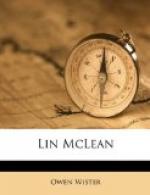And my pause strangely flashed on him something of that I had in my mind.
“No,” he said, his eyes steady and serious upon me, “don’t you ask about the things you’re meaning.” Then his face grew radiant and rather stern. “Do you suppose I don’t know she’s too good for me? And that some bygones can’t ever be bygones? But if you,” he said, “never come to look away up to a woman from away down, and mean to win her just the same as if you did deserve her, why, you’ll make a turruble mess of the whole business!”
When we walked in silence for a long while, he lighted again with the blossoming dawn of his sentiment. I thought of the coarse yet taking vagabond of twenty I had once chanced upon, and hunted and camped with since through the years. Decidedly he was not that boy to-day! It is not true that all of us rise through adversity, any more than that all plants need shadow. Some starve out of the sunshine; and I have seen misery deaden once kind people to everything but self—almost the saddest sight in the world! But Lin’s character had not stood well the ordeal of happiness, and for him certainly harsh days and responsibility had been needed to ripen the spirit. Yes, Jessamine Buckner would have been much too good for him before that humiliation of his marriage, and this care of young Billy with which he had loaded himself. “Lin,” said I, “I will drink your health and luck.”
“I’m healthy enough,” said he; and we came back to the main street and into the main saloon.
“How d’ye, boys?” said some one, and there was Nate Buckner. “It’s on me to-day,” he continued, shoving whiskey along the bar; and I saw he was a little drunk. “I’m setting ’em up,” he continued. “Why? Why, because”—he looked around for appreciation—“because it’s not every son-of-a-gun in Wyoming gets pardoned by Governor Barker. I’m important, I want you to understand,” he pursued to the cold bystanders. “They’ll have a picture of me in the Cheyenne paper. ‘The Bronco-buster of Powder River!’ They can’t do without me! If any son-of-a-gun here thinks he knows how to break a colt,” he shouted, looking around with the irrelevant fierceness of drink—and then his challenge ebbed vacantly in laughter as the subject blurred in his mind. “You’re not drinking, Lin,” said he.
“No,” said McLean, “I’m not.”
“Sworn off again? Well, water never did agree with me.”
“Yu’ never gave water the chance,” retorted the cow-puncher, and we left the place without my having drunk his health.
It was a grim beginning, this brag attempt to laugh his reputation down, with the jail door scarce closed behind him. “Folks are not going to like that,” said Lin, as we walked across the bridge again to the hotel. Yet the sister, left alone here after an hour at most of her brother’s company, would pretend it was a matter of course. Nate was not in, she told us at once. He had business to attend to and friends to see he must get




